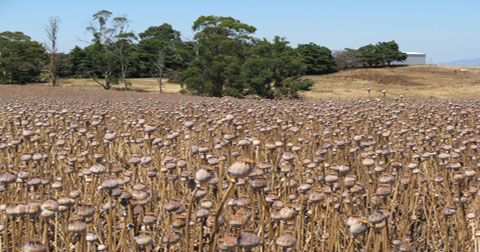
Australia’s epic drought could end up being something of a boon to neighboring New Zealand, at least in terms of aboveboard narcotic production. Half the world’s legal opium crop is grown on tiny Tasmania, largely under the auspices of Tasmania Alkaloids—a company that operates under the all-time most intentionally innocuous slogan of “Value Adding in Tasmania.” The lack of rain has been a killer for TA’s poppy crop, and so they’re experimenting with moving production to South Canterbury.
But New Zealand law forbids the cultivation of poppies rich in morphine. That means TA is consigned to planting only a variety that’s heavy on thebaine, the substance that pharmaceutical firms turn into Oxycontin and other painkilling pills. And that makes us wonder—has the “hillbilly heroin” phenomenon simply been a result of economics? Legal producers have obviously felt compelled to plant the thebaine poppies due to morphine’s sinister reputation. But that has inevitably resulted in a decline in the price of thebaine, and thus extra incentive for drug makers to take advantage of the pricing imbalance.
Once someone’s hooked, of course, they’re willing to pay whatever or their narcotic tipple of choice. But would there be less first-time Oxy users if prices hadn’t been knocked askew by poppy engineering?


Like gas stations in rural Texas after 10 pm, comments are closed.